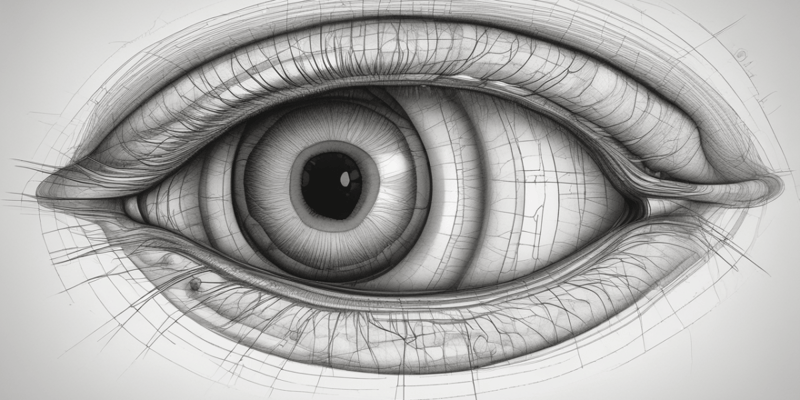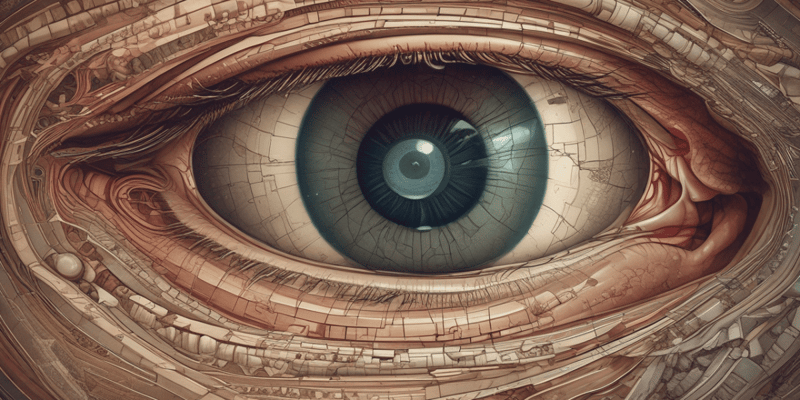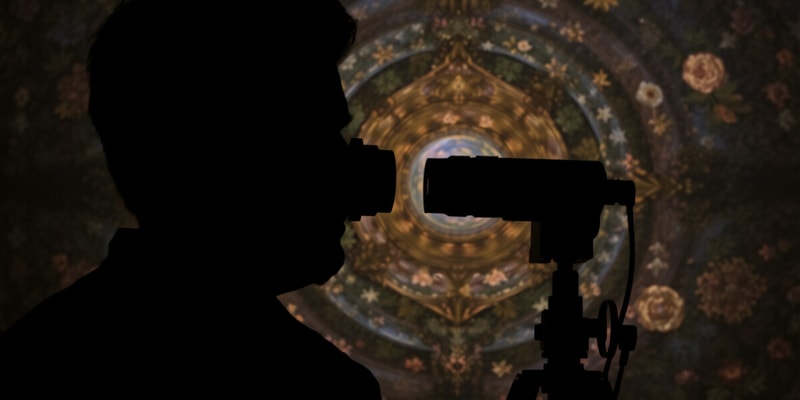Podcast
Questions and Answers
In what manner is the visual field projected to the retina?
In what manner is the visual field projected to the retina?
What is the path of the temporal visual field in the eye?
What is the path of the temporal visual field in the eye?
Where do the nerve fibers of the optic tract terminate?
Where do the nerve fibers of the optic tract terminate?
What is the function of the superior colliculi?
What is the function of the superior colliculi?
Signup and view all the answers
What is the result of the reflection of the coffee mug in Fig. 9 into the retina?
What is the result of the reflection of the coffee mug in Fig. 9 into the retina?
Signup and view all the answers
What is the process by which light from an object reaches the eye?
What is the process by which light from an object reaches the eye?
Signup and view all the answers
What is the name of the tract that forms the last relay of the visual pathway?
What is the name of the tract that forms the last relay of the visual pathway?
Signup and view all the answers
What is the function of the pretectal area?
What is the function of the pretectal area?
Signup and view all the answers
Which structure receives the majority of the fibers from the optic tract?
Which structure receives the majority of the fibers from the optic tract?
Signup and view all the answers
Which layers of the lateral geniculate body receive input from the ipsilateral eye?
Which layers of the lateral geniculate body receive input from the ipsilateral eye?
Signup and view all the answers
What is the characteristic of the optic radiations from the lateral part of the LGB?
What is the characteristic of the optic radiations from the lateral part of the LGB?
Signup and view all the answers
Which area of the occipital lobe receives impulses from the upper/dorsal retinal field?
Which area of the occipital lobe receives impulses from the upper/dorsal retinal field?
Signup and view all the answers
What is the function of the optic tract?
What is the function of the optic tract?
Signup and view all the answers
Which structure is involved in the formation of Meyer's loop?
Which structure is involved in the formation of Meyer's loop?
Signup and view all the answers
What is the characteristic of the lateral geniculate cells?
What is the characteristic of the lateral geniculate cells?
Signup and view all the answers
Where do the fibers from the optic radiations terminate?
Where do the fibers from the optic radiations terminate?
Signup and view all the answers
Where is the nucleus of the oculomotor nerve located?
Where is the nucleus of the oculomotor nerve located?
Signup and view all the answers
What is the function of the Edinger-Westphal nuclei?
What is the function of the Edinger-Westphal nuclei?
Signup and view all the answers
Which muscle is supplied by the trochlear nerve?
Which muscle is supplied by the trochlear nerve?
Signup and view all the answers
What is the function of the nucleus of Perlia?
What is the function of the nucleus of Perlia?
Signup and view all the answers
What is the oculomotor complex composed of?
What is the oculomotor complex composed of?
Signup and view all the answers
Which of the following muscles is not supplied by the oculomotor nerve?
Which of the following muscles is not supplied by the oculomotor nerve?
Signup and view all the answers
What is the location of the trochlear nerve nucleus?
What is the location of the trochlear nerve nucleus?
Signup and view all the answers
What is the function of the association nuclei in the oculomotor complex?
What is the function of the association nuclei in the oculomotor complex?
Signup and view all the answers
What is the purpose of using a pupil card with measurements or a ruler during the examination of pupil function?
What is the purpose of using a pupil card with measurements or a ruler during the examination of pupil function?
Signup and view all the answers
Why is it important to dim the lights appropriately during the examination of pupil function?
Why is it important to dim the lights appropriately during the examination of pupil function?
Signup and view all the answers
What is the purpose of the swinging flashlight test?
What is the purpose of the swinging flashlight test?
Signup and view all the answers
What is the correct sequence of the afferent pathway in the pupillary light reflex?
What is the correct sequence of the afferent pathway in the pupillary light reflex?
Signup and view all the answers
What is the difference between the pupillary light reflex and the pathway involved in focusing on an object?
What is the difference between the pupillary light reflex and the pathway involved in focusing on an object?
Signup and view all the answers
What is the purpose of having the patient fixate on a distant object during the examination of pupil function?
What is the purpose of having the patient fixate on a distant object during the examination of pupil function?
Signup and view all the answers
What is indicated by an affected eye's pupil not responding to an external stimulus, such as a penlight?
What is indicated by an affected eye's pupil not responding to an external stimulus, such as a penlight?
Signup and view all the answers
What is the role of the optic chiasm in the afferent pathway of the pupillary light reflex?
What is the role of the optic chiasm in the afferent pathway of the pupillary light reflex?
Signup and view all the answers
Which part of the brain is involved in rapid eye movement?
Which part of the brain is involved in rapid eye movement?
Signup and view all the answers
What is the role of the Medial Longitudinal Fasciculus?
What is the role of the Medial Longitudinal Fasciculus?
Signup and view all the answers
Which nerve nuclei are involved in eye movement?
Which nerve nuclei are involved in eye movement?
Signup and view all the answers
What is the function of the Occipital gaze center?
What is the function of the Occipital gaze center?
Signup and view all the answers
Where is the Rostral Internucleus of MLF located?
Where is the Rostral Internucleus of MLF located?
Signup and view all the answers
What is the term for the yoked muscles that work together to direct gaze in a given direction?
What is the term for the yoked muscles that work together to direct gaze in a given direction?
Signup and view all the answers
Which level of the command center is involved in voluntary eye movement?
Which level of the command center is involved in voluntary eye movement?
Signup and view all the answers
What is the name of the structure involved in lateral gaze?
What is the name of the structure involved in lateral gaze?
Signup and view all the answers
What is the term for the movement of the eyes in the same direction?
What is the term for the movement of the eyes in the same direction?
Signup and view all the answers
Which part of the brainstem extends from the posterior commissure to the upper cervical levels?
Which part of the brainstem extends from the posterior commissure to the upper cervical levels?
Signup and view all the answers
Study Notes
Visual Field and Retinal Projection
- The visual field is divided into 4 quadrants: nasal and temporal halves, and superior and inferior halves.
- The temporal visual field is projected to the nasal hemiretina, and the nasal visual field is projected to the temporal hemiretina.
- The upper visual field is reflected to the lower hemiretina, and the lower visual field is reflected to the upper hemiretina.
- The visual field is projected to the retina in an inverted (upside down) and reversed (left to right) manner.
Overview of the Eye
- Reflective rays of light from an object first strike the eye for vision to occur.
- The optic tract consists of nerve fibers that run directly without interruption posterior to the optic chiasm.
- The optic tract terminates in the lateral geniculate body, superior colliculi, or pretectal area.
Lateral Geniculate Body (LGB)
- The LGB is an oval swelling projecting from the pulvinar of the thalamus.
- The majority of optic tract fibers terminate in the LGB, which receives input from the retina representing the contralateral visual field.
- Each LGB contains a 6-layered neuron, with each layer receiving input from only one eye.
- There are no lateral geniculate cells with binocular receptive fields.
Optic Radiations/ Geniculocalcarine Tract
- The optic radiations are fibers from the axons of the LGB reaching the cortex.
- Fibers from the lateral part of the LGB are directed downward and forward, then bend backward in a sharp loop (Meyer's Loop) passing through the temporal lobe and sweep posteriorly to the occipital lobe.
- Medial fibers are more direct, with a non-looping course.
- Both fibers terminate in the cortical layer 4 of the upper and lower lips of the calcarine fissure in the occipital lobe.
Oculomotor Nerve (CN III)
- The oculomotor nerve nucleus is located at the level of the superior colliculus of the midbrain.
- The oculomotor nerve consists of different nuclear groups, including the lateral nucleus, Edinger-Westphal nuclei, and midline nuclei.
- The lateral nucleus supplies the superior, medial, and inferior recti, and inferior oblique muscles.
- The Edinger-Westphal nuclei supply the ciliary muscle and sphincter pupillae muscles.
Trochlear Nerve (CN IV)
- The trochlear nerve is located at the inferior colliculus of the midbrain.
- The trochlear nerve supplies the superior oblique muscle.
Pupillary Light Reflex
- The pupillary light reflex is a reflexive response to light that involves the constriction of the pupil.
- The reflex pathway includes the retina, optic nerve, optic chiasm, optic tract, and superior colliculus.
- The examination of pupil function should include assessment of pupil size, reactivity to light, and direct and consensual response.
Supranuclear, Nuclear, and Infranuclear Levels
- The supranuclear level is above the nucleus and involves the cerebral hemispheres.
- The nuclear level is at the pons and contains the nucleus of the nerves (CN III, IV, VI) innervating the muscles.
- The infranuclear level involves the nerves (CN III, IV, VI) and their involvement in muscle movement.
Pathway of Eye Movements
- The pathway of eye movements involves the yoke muscles, which are contralaterally paired EOMs that work synergistically to direct gaze in a given direction.
- The medial longitudinal fasciculus (MLF) controls and coordinates eye movements, acting as a bridge between the two sides of the brainstem.
Studying That Suits You
Use AI to generate personalized quizzes and flashcards to suit your learning preferences.
Description
This quiz covers the concept of visual field projection, including the inversion and reversion of the retinal field. It also explores the division of the visual field into quadrants and the corresponding optical properties of the lens. Test your understanding of how visual information is projected onto the retina.




